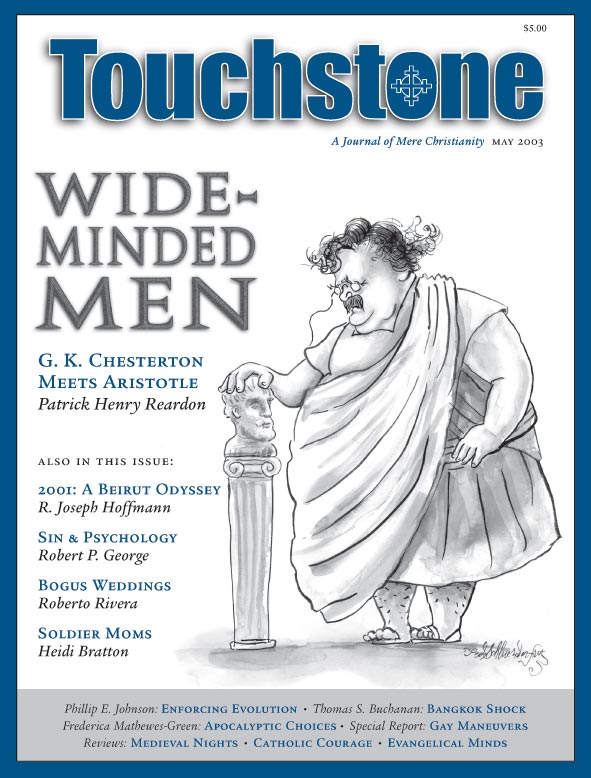Soldiers on the Home Front
Heidi Bratton on the Vocation of Motherhood
As I have read the media’s recent treatment of the “children versus career” question facing many modern women, I’ve noticed that every journalist addresses the question from the woman’s point of view. Time magazine asked in a cover article: “Babies vs. Career: Which should come first for women who want both?” The Boston Globe responded with an article that asked who is happier, “professional women with children or professional women without children?” Women of every stripe are encouraged to ask, “What’s the best time, place, and situation for me to have children? How can I be a successful mom?”
Unfortunately, two fatal flaws in these questions put any Christian woman asking them in direct conflict with her faith. Let’s look at the first flaw. To ask how a woman can derive the most benefit from having a child is to put the cart before the horse; it reflects an immature understanding of Christian motherhood.
The First Flaw
The Christian worldview values the nurturing of life as not just one of many choices God wants us to balance successfully, but as the ultimate privilege he wants us to embrace faithfully, even sacrificially. Given that becoming a mother provides a woman with a unique opportunity to nurture life and that having children is the normative expectation of a Christian marriage, a woman’s first thoughts about motherhood should not be “How can I add little people to my life with as little hassle as possible?” but rather, “Dear God, what must go so that children can come?”
What does this mean in practice? Mother Teresa of Calcutta said to women:
You and I, being women, we have this tremendous thing in us, understanding love. I see that so beautifully in our people, in our poor women, who day after day, meet suffering, accept suffering for the sake of their children. I have seen mothers going without so many things, even resorting to begging, so that the children may have what they need.
The mothers of India demonstrate their practical willingness to put their children’s needs above their own by their self-sacrificing actions, even to the point of begging. Where is this willingness in our society? As evidenced by the Time and Boston Globe articles, it seems to be lost.
American children are not starving for food, but they are starving for a more generous portion of their mothers’ presence in their lives. Instead of accepting personal sacrifice for the sake of their children, as do mothers in India, American mothers spend their energy debating how to have both a career and kids without missing a beat. It is tragic. Caught on this success-based, me-centered merry-go-round, mothers abandon six-week-old infants to virtual strangers at mercenary daycare centers. They put their school-aged children in before- and after-care programs that have the kids eating breakfast, lunch, and dinner at school. Mothers leave kids just approaching their teens to be unsupervised latchkey kids.
None of these solutions will work in the long run, because they do not nurture life. Working Mother, a magazine that is ironically dedicated to helping mothers stay in the workplace, proved the point in its presentation of an independent child-care report called “Who’s Watching the Kids?” The report concluded that the overall quality of childcare in the nation is “unacceptable.” The adult-to-child ratios in child-care centers were such that “teachers are so busy feeding, changing, and cleaning the children that there is no time for chitchat—no time for human interaction that is just as important to a child as being fed.”
Because only a mother can provide the care her child really needs, a Christian woman should not attempt the split-focus pretense of pursuing a full-time career and being the best possible mom at the same time. The care of children is an issue of critical importance that our society has not been willing to address in a manner that keeps children’s welfare as the top priority, not mothers’ convenience or employers’ ease. The reason? Our success-obsessed society is asking its childcare questions not only in the wrong order (mother first, child second), but also from the wrong point of view.
subscription options
Order
Print/Online Subscription

Get six issues (one year) of Touchstone PLUS full online access including pdf downloads for only $39.95. That's only $3.34 per month!
Order
Online Only
Subscription

Get a one-year full-access subscription to the Touchstone online archives for only $19.95. That's only $1.66 per month!
bulk subscriptions
Order Touchstone subscriptions in bulk and save $10 per sub! Each subscription includes 6 issues of Touchstone plus full online access to touchstonemag.com—including archives, videos, and pdf downloads of recent issues for only $29.95 each! Great for churches or study groups.
Transactions will be processed on a secure server.
more on Motherhood from the online archives
more from the online archives

37.5—Sept/Oct 2024
Why Law Schools Can't Teach Law
A sidebar to How Law Lost Its Way by Adam MacLeod
calling all readers
Please Donate
"There are magazines worth reading but few worth saving . . . Touchstone is just such a magazine."
—Alice von Hildebrand
"Here we do not concede one square millimeter of territory to falsehood, folly, contemporary sentimentality, or fashion. We speak the truth, and let God be our judge. . . . Touchstone is the one committedly Christian conservative journal."
—Anthony Esolen, Touchstone senior editor








